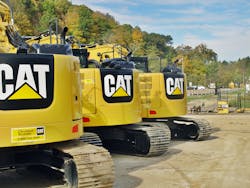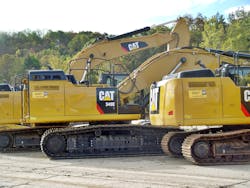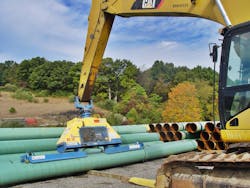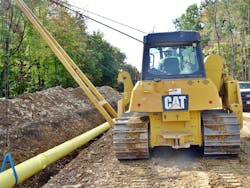It was pretty good to be a Caterpillar dealer in western and central Pennsylvania until the recession hit around 2008. Like construction work in most places, business slowed to a crawl and Cleveland Brothers — which handles 59 counties in west and central Pennsylvania, 17 counties in West Virginia and two in western Maryland — ended up laying off nearly a third of its 1,500 employees.
And then shale gas was discovered and everything changed.
It might seem to have happened overnight, but that’s not exactly accurate when you consider oil was first discovered in northwestern Pennsylvania in 1859. Although various companies take credit for being the first to drill for gas in shale rock, according to the Governor’s Marcellus Shale Advisory Commission, Texas-basedcontractor Range Resources drilled the first shale well site in 2004, although it wasn’t made public until 2008.
But by 2010, the phrase “hydraulic fracturing” or “fracking” became part of everyday vocabulary and hundreds of Caterpillar machines were being rented to build drilling pads to extract natural gas from shale rock formations miles below the surface of this mountainous terrain.
But few people really were aware of the scope and size of the Marcellus Shale and what it would mean to the region’s economy. It wasn’t on the mind of owners Jay Cleveland and Tom Kirchhoff when Cleveland Brothers Equipment Co. bought Beckwith Machinery Co. in 2005, giving it the west Pennsylvania and northern West Virginia region, along with One Call Rentals, Beckwith’s dedicated rental outlets. Nor did they really have visibility into what would develop in 2009 and 2010 when they were laying off hundreds of employees who had helped build one of the country’s larger Caterpillar dealerships in the previous couple of decades, although around that time one of the Cleveland Brothers’ salespeople remarked “this could really turn into something.” But it would be awhile still before it would.
“I never imagined when we acquired Beckwith Machinery in October of ’05 that oil and gas would become a significant contributor to our performance. We had no visibility to it even though the first oil well was drilled in Pennsylvania many years ago,” says Cleveland. “We certainly had no idea how big it would be for us. In the downturn of ’09 there was some talk about oil and gas. And then as 2010 rolled out, that’s what really brought us back from the doldrums. Pad development came on full force throughout 2010 and then a lot of drilling after that.”
The Marcellus natural gas playnow encompasses 104,000 square miles and stretches across Pennsylvania and West Virginia, and into southeast Ohio and upstate New York, and is the largest source of natural gas in the United States. Production is still growing rapidly.According to an Energy Information Administration report issued last month, and reported on in the Wall Street Journal, natural gas production from the Marcellus Shale region is growing faster than expected, and has now reached 12 billion cubic feet a day. That's the energy equivalent of about 2 million barrels of oil a day, and more than six times the 2009 production rate. The Marcellus Shale now produces more natural gas than Saudi Arabia.
What does this oil and gas bonanza mean to a Caterpillar dealership/rental company? It’s more than supplying equipment for the building of well-drilling pads. It means pipeline construction, which involves large quantities of earthmoving equipment, with equipment needs hard to imagine, such as an order for 50 excavators and 20 dozers to be delivered within a week for a pipeline project. Also, it’s not only earthmoving equipment. With work going on around the clock, light towers are in huge demand and in large quantities. Oil and gas exploration generally occurs in remote areas, generators are a hot item as well. Pumps are needed on all sites and ground-heating equipment has become an item in great demand as innovating and inventive oil companies wrap valves with the ground heaters’ hoses to keep water from freezing. Compact equipment such as skid-steer loaders, as well as telehandlers and aerial work platforms, are also in high demand. Engine service opportunities have been plentiful, as well, considering the quantity of compression stations needed to support the industry.
Beyond the actual oil drilling, fracking or pipeline sites, infrastructure work is required in abundance. In some areas of the country, such as Williston, N.D., near the Bakken Shale, there is little infrastructure such as roads to oil exploration sites, housing for the thousands of workers that have flooded the area, and all the other services such as hotels, restaurants, and other types of business required to service the influx of people. While infrastructure was more developed in Pennsylvania, still, in areas near drilling sites, road improvement, housing, restaurants, small strip malls and other needs have led to dramatic construction increases.
Office and industrial parks that hadn’t seen new construction in many years have been revitalized, as many large companies search for office and warehouse space. Large buildings began springing up in parks such as South Point in Canonsburg near the Pittsburgh airport.
Everybody to the oil fields?
It might seem that with such a dramatic increase in demand for equipment that rental companies would flock to the oil-producing areas seeking immediate big-time payoffs. Sure, those 50-excavator orders are a salesman’s dream, but for a distributor/rental company the investment in inventory is huge, the logistical capability of delivering such an order on time and being able to maintain the machines in top-running condition on a 24/7 basis no small task as any functional rental company knows. And of course the flip side of this astounding revenue boost is the fact that just as quickly as an order for 50 excavators can be made, that same quantity of machines can be called off rent, demanding the same level of logistical preparation.
While there are certain niche suppliers that tend to follow oil-production companies from job to job and market to market, for the most part long-established operations such as Cleveland Brothers that already have the capability and infrastructure in place along with local connections and relationships with contractors and supply-chain providers, have been able to make the most of the oil and gas opportunities.
“It takes substantial investment in inventory and things of that nature to serve oil companies, so there is risk involved,” says Cleveland. “And this will run in a cycle. It’s going to be good, but it’s not going to be running on all cylinders for the next 10 years. You’re going to have your cycles to it just like you do with any other business. We’re very mindful of that. The guys who’ve been in this business for a long time, other dealers, have told us it will run for 10 or 15 years, but you’re going to have a dip or two in there, it’s going to happen. You get pad development, then you get drilling, then you get fracking, then you get pipelines. They don’t all happen all the time. So you stay close to the customers, let them know you’re here to support their needs.”
History in the region counts for a lot for Cleveland Brothers. Not only does Cleveland Brothers rent to oil and gas companies directly but they also rent to contractors who migrated into the oil and gas-related business.
“A lot of our contractors went into the pad development business,” says Cleveland. “They were heavy/highway contractors now doing 100 pads a year because there hasn’t been a highway bill in over three years, so they’ve utilized their assets in a different way.” The fact that Cleveland Brothers have been doing business successfully for decades made it a natural transition into the oil-and-gas business, partly because many of the contractor customers were the same people and also because newcomers to the area who came to work on pipelines or other related businesses did their homework and found out who had the reputation in the area.
“It’s still a relationship business,” says Cleveland.
For a company like Cleveland Brothers, to benefit from the oil and gas boom means substantial preparation and investment to the tune of about $300 million invested in inventory since 2010. Obviously a small rental company that thinks it can just come in and capitalize on an oil boom would not be prepared to make such a commitment.
“There are a number of rental companies that follow these companies around from state to state and we have seen these companies pop up to support them,” says Cleveland. “The one thing that may be different is that the weather here can be pretty severe compared to other areas in the country. It’s the same with some contractors. They bring in D6s to do D8 work but they didn’t know what the terrain is like here. There are learning curves for them.”
There have been some steep learning curves for Cleveland Brothers in servicing the oil and gas business, with its unique and different demands and applications. Fortunately, Cleveland Brothers formed a team to specialize in the oil and gas business, to complement their traditional territory sales coverage. Cleveland Brothers found having employees who understand the unique requirements and processes of pipeline construction, hydraulic fracturing and other oil exploration needs, effectively serves the needs of this unique customer base.
“Placing employees solely focused on this industry has been extremely effective,” says Darrin Foulk, Cleveland Brothers vice president. “We found having industry specialists, in addition to product specialists works very well to support various customer bases.”
“A few years ago, we segmented our customers by industry and aligned our sales force to improve market penetration,” Foulk adds. “We found having experts focused on specific industries interacting with customers in a consultative manner is very effective. We are able to better understand our customers’ needs and offer industry-specific creative solutions.”
Pipeline construction has been very robust the past few years in Pennsylvania and West Virginia. “The size of the pipe on these projects varies greatly, which presents inventory planning challenges,” says Cleveland. “For example, the mainline projects (36-inch-plus pipe) call for large machines while midstream projects, which tie in the wells to the mainlines, call for smaller units. We were used to seeing a few pipeline projects in our territory each year, now there’s dozens of projects all year long, with some hundreds of miles long.”
Oil benefits
The benefits of the oil boom to Cleveland Brothers cannot be measured just in revenue, which has grown significantly since the Marcellus Shale play began.
“It meant 200 jobs to our company,” says Cleveland. “With the great recession, we had to cut almost 500 people, about a third of the company, we were 1,500 before and we cut to 1,063. From there we’ve added to 1,250 or 1,275, so it’s close to 200 jobs and we’ve developed other businesses too and that has been another interesting piece to it.”
One of the other businesses Cleveland alludes to has been the company’s construction of fracking trailers. In response to requests from customers for fracking trailers, basically an engine and transmission on a trailer with a pump to pressurize water for fracturing shale rock, Cleveland Brothers got into the business of manufacturing its own.
“We had a partner that built them, we supplied the engine and the transmission, and we helped with the engineering of it,” says Cleveland. “There was a fluid end pump that we did not supply for that one, but we have the capability to do that now. We have a partner out of Somerset, JJ Trailer, they actually assembled it. We did the inspection and things like that along with the customer.”
Cleveland Brothers also leveraged a machining and chroming facility, and can now repair the fluidends on the backs of the fracking trailers. Caterpillar now has a joint venture with another company to manufacture and sell the fluid ends.Cleveland Brothers also does machining and re-manufacturing of fluid ends for customers. The chroming facility adds to the wide-ranging services Cleveland Brothers is able to offer customers and ability to repair its own fleet, including welding, track repair and just about every type of repair except for the very largest Caterpillar engines.
One of the challenges that have come along with the oil and gas business is finding qualified staff, particularly drivers and technicians as oil companies are always seeking such workers, offering high salaries.
“Finding mechanics is a big issue,” says Cleveland Brothers regional sales manager Chris Marteney. “In the construction industry it was always an issue. In the oil industry, now all the companies have their own mechanics out there onsite. The drillers have their own mechanics. They pay extremely well, and they have sucked from the pool that we typically would draw from. As for drivers, you see signs around here everywhere ‘CDL Drivers Wanted’!”
“We’ve always partnered with local trade schools, offered scholarships with technical schools and we’ve continued to do that, but you don’t get enough people out of those, so we have also targeted military fairs across the country,” adds Foulk. “We added two recruiters to our HR department to help us find people.”
History in rental
If history in its region is an advantage, it’s no surprise that Cleveland Brothers is dominant in its market area. Bob and Roy Cleveland, Jay Cleveland’s grandfather and his brother, started a successful landscaping company in 1937. When a Caterpillar territory became available from a New Jersey Cat dealer in 1948, Bob and Ray Cleveland went to Peoria, Ill., to make a presentation to Caterpillar. They were successful in their presentation and acquired the territory from the Beckwith family.
In 1965, the Cleveland Brothers purchase New York Caterpillar dealers H.O. Penn Machinery and half of the Cleveland family moved to New York to take over the dealership.
“My father and his father stayed in Harrisburg,” says Jay Cleveland. “We don’t have any financial interest in H.O. Penn Machinery,” which is owned and operated by Cleveland’s cousin Rob and his father. In 1988, Jay Cleveland Jr. joined the company and is currently president/CEO. His cousin Tom Kirchhoff joined the company in 1994 and is currently the executive vice president and chief operating officer.
Cleveland Brothers got into the rental business during the mid-1980s, before many Caterpillar dealers were urged by Caterpillar management to get involved in rental.
“We started with D3s to D8s, excavators, backhoes, scrapers,” recalls Cleveland. “It wasn’t a huge fleet like we have today; it was probably $20 to $25 million. The focus was more on ownership. In the beginning, we kind of dipped our toes in the water and then it grew the fleet in the ‘90s. It really was a way for us to capture more market share and create, I would say, different price points for tractors in the marketplace. Not everybody wanted to buy something brand-spanking new. Some wanted something with 500 hours or 1,200 hours and we grew revenue that way. It’s been a great move for us, as it created opportunities in new markets we wouldn’t have been in if we didn’t fully commit to rental. In 1997 Caterpillar formally launched The Cat Rental Store brand concept, we jumped into rental services full bore and we really haven’t looked back. We committed the facilities and people and fleet and we aggressively went after the business.”
Trickle-down effect
The dramatic presence of the Marcellus Shale in Cleveland Brothers’ territory has fueled its dramatic growth since 2010. In fact, in the view of Cleveland, the company would still be in recession if it were not for the shale play.
“We would still be in a recession in Pennsylvania,” says Cleveland. “We don’t have a road program and I would estimate 70, maybe 75 percent of the residential commercial development is in some way tied to the oil and gas business. Oil and gas exploration has had a trickle-down effect to other parts of the construction industry, but without that, our market would not be in recovery. The coal business is under significant pressure from EPA and the federal administration right now. Given that coal-related business historically has been about 20-30 percent of Cleveland Brothers revenue, in any given year, the loss of coal-related revenue is difficult to overcome. So, without the oil and gas activity we would be in a very slow growth economy if not still receding.”
Fortunately, the future looks bright for the oil and gas industry for quite a few years to come. That being said, Cleveland Brothers’ owners know they must keep watchful eyes on key market indications, and be prepared for future cycles and market changes. “With a fleet as large as ours, you could get into trouble if you aren’t keeping an eye on the activity and utilization.” rer
About the Author
Michael Roth
Editor
Michael Roth has covered the equipment rental industry full time for RER since 1989 and has served as the magazine’s editor in chief since 1994. He has nearly 30 years experience as a professional journalist. Roth has visited hundreds of rental centers and industry manufacturers, written hundreds of feature stories for RER and thousands of news stories for the magazine and its electronic newsletter RER Reports. Roth has interviewed leading executives for most of the industry’s largest rental companies and manufacturers as well as hundreds of smaller independent companies. He has visited with and reported on rental companies and manufacturers in Europe, Central America and Asia as well as Mexico, Canada and the United States. Roth was co-founder of RER Reports, the industry’s first weekly newsletter, which began as a fax newsletter in 1996, and later became an online newsletter. Roth has spoken at conventions sponsored by the American Rental Association, Associated Equipment Distributors, California Rental Association and other industry events and has spoken before industry groups in several countries. He lives and works in Los Angeles when he’s not traveling to cover industry events.






